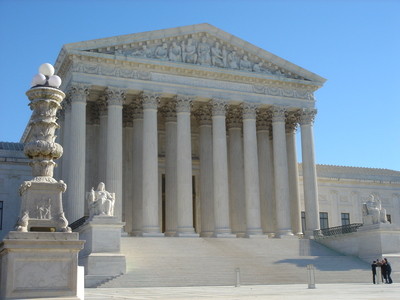Clean Air Act
The Role of Permits in the Regulatory State
The structure of permitting programs can make a big difference for the implementation of environmental law
Author’s Note: The following post is co-authored by Eric Biber and J.B. Ruhl, the David Daniels Allen Distinguished Chair of Law and the Co-Director of the Energy, Environment, and Land Use Program at Vanderbilt Law School. This post is cross-posted at Reg Blog. Reg Blog, supported by the U Penn Program on Regulation is an …
Continue reading “The Role of Permits in the Regulatory State”
CONTINUE READINGHow Scalia Might Have Ended the Best Hope of Killing EPA’s Greenhouse Gas Rules
The Supreme Court may have just eliminated a major legal and political risk to EPA’s greenhouse gas regulatory program
A couple of folks have already written about the UARG decision, and there is surely more to understand about the implications of the Scalia majority decision for future EPA greenhouse gas regulatory efforts. But I want to highlight one key implication of the decision for EPA’s overall greenhouse gas regulatory program. First, it is important …
Continue reading “How Scalia Might Have Ended the Best Hope of Killing EPA’s Greenhouse Gas Rules”
CONTINUE READINGBreaking News: U.S. Supreme Court Renders Split Decision in Major Climate Change Case
The U.S. Supreme Court today issued its long-awaited decision in Utility Air Regulatory Group v. Environmental Protection Agency, the justices’ third encounter with climate change law and policy. In a Solomonic ruling, the Court ruled that EPA lacks authority to require the operators of “stationary sources” of greenhouse gas emissions (power plants, factories, etc.) to obtain …
CONTINUE READINGThe 2014 Midterm Elections and the EPA Greenhouse Gas Rule
Why Republicans probably won’t be able to eliminate the EPA rules before 2016
I wrote earlier about why the 2016 Presidential election will be the election that matters (politically) for the long-term success of the new greenhouse gas rules proposed by EPA. (The status of legal challenges is a different question.) I want to elaborate a little more now about why the 2014 midterm elections are pretty much …
Continue reading “The 2014 Midterm Elections and the EPA Greenhouse Gas Rule”
CONTINUE READINGA Bailout By Any Other Name…
Weak environmental laws are another form of bailouts for private industry
Bailouts – the payment of public funds or resources to rescue or support a private enterprise – are politically very unpopular. The primary challenger who defeated Republican House Majority Leader Eric Cantor in Virginia excoriated Cantor for supporting big banks in the wake of the financial crisis. The bailout of banks after the crisis that …
Continue reading “A Bailout By Any Other Name…”
CONTINUE READINGCompiled Resources on the “Clean Power Plan” Proposed §111(d) Rule
All LegalPlanet resources on regulation of GHGs under 111(d), plus critical EPA resources and other valuable analyses
Today, EPA officially published the Clean Power Plan, the agency’s proposed rule to regulate power plant greenhouse gas emissions under Clean Air Act § 111(d), initiating a public comment period that will close on December 1, 2014. I have taken this as an opportunity to compile all of the various LegalPlanet resources on regulation of …
Continue reading “Compiled Resources on the “Clean Power Plan” Proposed §111(d) Rule”
CONTINUE READINGUARG Decision — Due Any Day Now — Should Not Undermine the Legality of CAA Section 111d Rules
Case involves statutory interpretation questions not relevant to power plant rules
The U.S. Supreme Court should issue a decision in Utility Air Regulatory Group (UARG) v. EPA very soon, perhaps as early as Monday (the Court typically issues its opinions on Mondays and Thursdays at 10:00 a.m. EST). The case involves an important set of regulations designed to regulate greenhouse gases from large new “sources” (industrial facilities, chemical …
CONTINUE READINGAnd Now For Something Completely Different: Chemical Facility Safety?
For the past few days we have all been focused—justifiably—on the EPA’s proposed carbon rule for power plants. But that’s not all EPA and the rest of the federal government have been up to recently. Today a federal interagency working group established under Executive Order 13650, Improving Chemical Facility Safety and Security (“EO 13650”) issued …
Continue reading “And Now For Something Completely Different: Chemical Facility Safety?”
CONTINUE READINGPART III – EPA’s Proposed 111(d) Rule: Some Insights & Open Legal Questions
The third in a series of posts offering some initial insights and observations, and posing several open legal questions for conversation
This is the third in a series of posts offering some initial insights and observations, and posing several open legal questions related to EPA’s proposed 111(d) rule. (See the first and second posts.) Over the course of this series, I welcome our knowledgeable and insightful LegalPlanet audience to join the dialogue in the comments. What …
Continue reading “PART III – EPA’s Proposed 111(d) Rule: Some Insights & Open Legal Questions”
CONTINUE READINGLegislative Tantrums Over EPA’s Proposed Carbon Rule
Politico reports that eight state legislatures have passed bills protesting EPA’s proposed power plant regulation, in at least one case refusing to comply with any eventual regulations. This was a childish tantrum rather than an adult response. The ultimate hope, according to Politico, is that many states will refuse to submit compliance plans, and that this …
Continue reading “Legislative Tantrums Over EPA’s Proposed Carbon Rule”
CONTINUE READING





